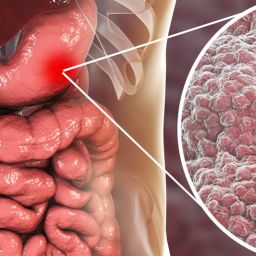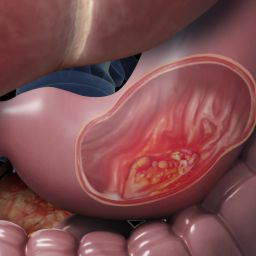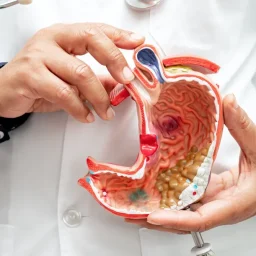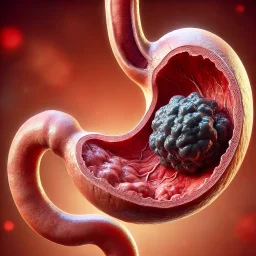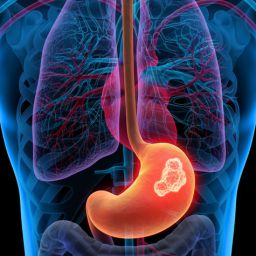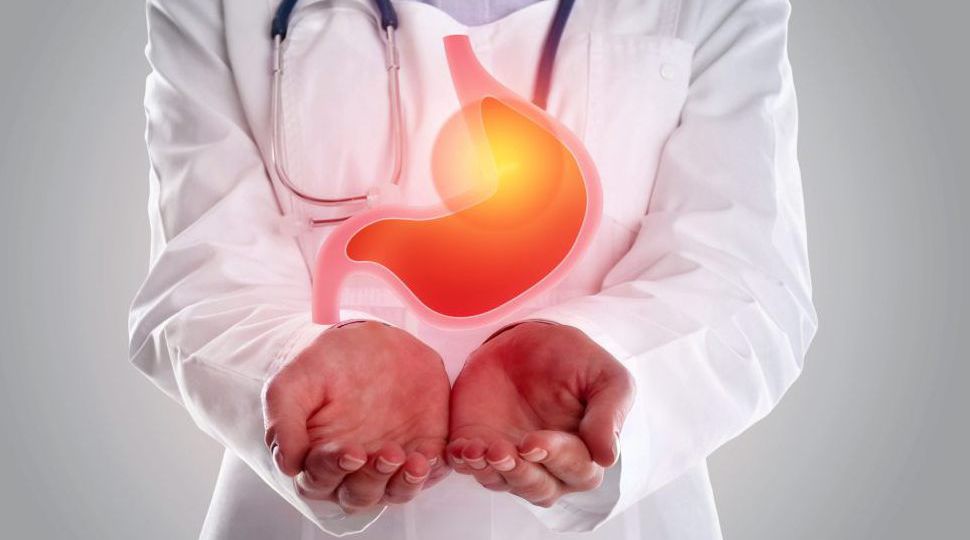
1. Surgical Treatment for Stomach Cancer
Surgery is one of the most effective treatments for stomach cancer, particularly when the cancer is detected in its early stages. The main goal of surgery is to remove the cancerous tumor and as much surrounding tissue as necessary to prevent the spread of cancer. In some cases, surgery is also performed to relieve symptoms in patients with advanced cancer.
a) Gastrectomy
Gastrectomy refers to the surgical removal of part or all of the stomach. The extent of the surgery depends on the size, location, and spread of the cancer. There are two primary types of gastrectomy:
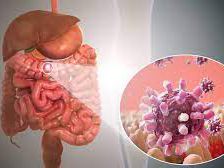
- Partial Gastrectomy: This surgery involves the removal of a portion of the stomach that contains the cancerous growth. The remaining stomach is then reconnected to the small intestine, allowing for the continuation of normal digestion.
- Total Gastrectomy: If the cancer is widespread within the stomach, a total gastrectomy may be necessary, where the entire stomach is removed. After this procedure, the esophagus is directly connected to the small intestine, and the patient will need to adjust to life without a stomach, with the help of dietary and lifestyle changes.
b) Lymph Node Dissection
During surgery, nearby lymph nodes may also be removed to check for signs of cancer spread. This procedure, known as lymphadenectomy, helps determine the stage of the cancer and guides further treatment decisions.
Surgery is typically used for patients with localized cancer that has not spread to distant organs. In some cases, surgery may be combined with other treatments, such as chemotherapy or radiation therapy, to increase the chances of a successful outcome.
2. Chemotherapy: Systemic Treatment
Chemotherapy uses drugs to kill cancer cells or stop them from growing. It is a systemic treatment, meaning it affects the entire body. Chemotherapy is most effective against cancer that has spread beyond the stomach, making it a crucial treatment for advanced or metastatic stomach cancer.
a) Neoadjuvant Chemotherapy
In some cases, chemotherapy is administered before surgery, in a process known as neoadjuvant therapy. The purpose of this treatment is to shrink the tumor, making it easier to remove during surgery. Neoadjuvant chemotherapy is typically used for larger tumors or when surgery is initially not an option.
b) Adjuvant Chemotherapy
After surgery, chemotherapy may be used to kill any remaining cancer cells that might not have been visible during surgery. This is referred to as adjuvant chemotherapy. It helps reduce the risk of cancer recurrence and can improve long-term survival rates.
c) Chemotherapy for Advanced Cancer
For patients with advanced or metastatic stomach cancer, chemotherapy can help reduce symptoms, slow the cancer’s progression, and improve the quality of life. In many cases, chemotherapy is combined with other treatment modalities, such as targeted therapies or immunotherapy.
Common Chemotherapy Drugs for Stomach Cancer
- Fluorouracil (5-FU)
- Cisplatin
- Oxaliplatin
- Capecitabine
- Docetaxel
Chemotherapy is often associated with side effects, such as nausea, fatigue, hair loss, and weakened immune function. However, the side effects vary depending on the specific drugs used and the individual patient’s response to treatment.
3. Radiation Therapy
Radiation therapy involves using high-energy radiation to kill cancer cells or shrink tumors. It is typically used in combination with other treatments such as surgery and chemotherapy. Radiation therapy can be beneficial for patients with tumors that are difficult to remove surgically, or in cases where the cancer has spread to nearby lymph nodes or other tissues.
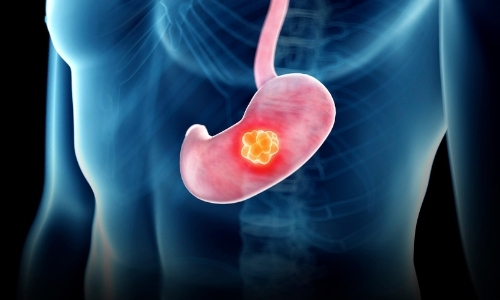
a) External Beam Radiation Therapy
This is the most common form of radiation therapy for stomach cancer. In this procedure, radiation is directed toward the tumor from outside the body using a machine called a linear accelerator. It typically requires several sessions over the course of weeks.
b) Brachytherapy
In some cases, doctors may use a form of radiation called brachytherapy, where radioactive material is placed directly into or near the tumor. This allows for higher doses of radiation to be delivered directly to the cancer cells while minimizing damage to surrounding healthy tissue.
Radiation therapy can cause side effects such as fatigue, nausea, and skin irritation, but these typically subside after treatment concludes. The benefits of radiation therapy in treating stomach cancer include its ability to reduce tumor size, alleviate pain, and treat cancer cells that may not have been removed during surgery.
4. Targeted Therapy
Targeted therapy is a newer treatment approach that targets specific molecules involved in cancer growth. These therapies are designed to attack cancer cells while causing less harm to normal cells compared to traditional chemotherapy. Targeted therapies are particularly useful for advanced stomach cancer that cannot be treated with surgery or chemotherapy alone.
a) HER2 Inhibitors
One of the most notable advances in targeted therapy for stomach cancer involves the use of drugs that target the HER2 protein, which is overexpressed in some gastric cancers. HER2-positive cancers tend to grow more aggressively, and blocking this protein can slow the tumor’s progression.
- Trastuzumab (Herceptin): Trastuzumab is a monoclonal antibody that targets the HER2 protein and is commonly used in combination with chemotherapy for patients with HER2-positive stomach cancer. It can improve survival and reduce the risk of cancer recurrence.
b) Angiogenesis Inhibitors
Another approach to targeted therapy involves inhibiting the process of angiogenesis, which is the formation of new blood vessels that supply the tumor with nutrients and oxygen. By blocking angiogenesis, targeted therapies can help starve the cancer cells and limit their growth.
- Ramucirumab (Cyramza): Ramucirumab is a drug that inhibits angiogenesis and has been shown to be effective in treating advanced gastric cancer. It is often used in combination with chemotherapy.
Targeted therapies can cause side effects, although they tend to be less severe than those of chemotherapy. Some potential side effects include high blood pressure, diarrhea, and fatigue.
5. Immunotherapy
Immunotherapy is a cutting-edge treatment that boosts the body’s immune system to fight cancer. This approach is especially useful for cancers that are resistant to traditional therapies. Immunotherapy drugs help the immune system recognize and attack cancer cells more effectively.
a) Checkpoint Inhibitors
Checkpoint inhibitors are a type of immunotherapy that block the proteins that prevent immune cells from attacking cancer cells. The two most commonly used checkpoint inhibitors for stomach cancer are:
- Pembrolizumab (Keytruda): Pembrolizumab is a PD-1 inhibitor that has been shown to be effective for patients with advanced stomach cancer, particularly those whose tumors express certain genetic mutations.
- Nivolumab (Opdivo): Nivolumab is another PD-1 inhibitor that works similarly to pembrolizumab and is used for treating gastric cancer.
b) Combination Immunotherapy
Sometimes, immunotherapy is used in combination with chemotherapy or targeted therapy to enhance the body’s immune response and increase the treatment’s effectiveness. These combination therapies have shown promising results in clinical trials, particularly for patients with metastatic stomach cancer.
Immunotherapy may cause immune-related side effects, such as inflammation of the lungs, liver, or other organs. These side effects are typically manageable with medical intervention.
6. Palliative Care and Symptom Management
In advanced stages of stomach cancer, where the cancer is no longer curable, palliative care plays a crucial role in improving the patient’s quality of life. Palliative care aims to relieve symptoms such as pain, nausea, and difficulty swallowing, while also addressing emotional and psychological concerns.
Palliative treatments may include:
- Stent Placement: A stent can be inserted into the stomach or esophagus to help relieve blockages caused by the tumor, making it easier for the patient to eat and swallow.
- Pain Management: Pain relief medications, including opioids, can help control pain in advanced stomach cancer.
- Nutritional Support: Nutritional counseling and feeding tubes may be recommended to ensure patients maintain adequate nutrition if they are unable to eat due to obstruction.
The treatment of stomach cancer involves a multifaceted approach that combines surgery, chemotherapy, radiation therapy, targeted therapies, and immunotherapy. The choice of treatment depends on various factors such as the stage of the cancer, the patient’s overall health, and the tumor’s specific characteristics. While the prognosis for stomach cancer can vary, significant advances in treatment have improved outcomes for many patients, especially with early detection and personalized therapy. Patients diagnosed with stomach cancer should consult with a multidisciplinary team of healthcare professionals to determine the best course of treatment based on their unique situation.
As research continues to advance, new treatments and more effective combinations of existing therapies hold promise for improving survival rates and quality of life for those affected by this challenging disease.

